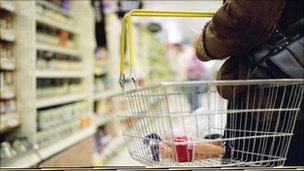Household spending frozen, says ONS report
- Published

Households spent the most on transport and housing costs according to the ONS
Britons' weekly spending was broadly flat in real terms last year, official figures have revealed.
The average UK household spending in 2010 rose to £473.60 a week from £455 the previous year according to a report by the Office of National Statistics, external.
However once adjusted for inflation, weekly spending in 2009 was £476.
The poll of 5,260 households show that excluding mortgage payments, the main expenditures were transport and housing costs such as rent and fuel.
Households on average spent £65 a week on transport, a rise of £7 on 2009 levels. An increase in the cost of petrol and diesel was said to be the main reason for this.
Housing costs such as rent, household repairs, utilities and fuels were the second-biggest spending category, followed closely by recreation and culture costs.
Across the UK, figures from 2008 to 2010 show that households in London had the highest expenditure of £577.80, followed by south-east England (£523.20) and eastern England (£493.40).
Spending was the lowest in households in north-east England (£372.70), Wales (£394) and Yorkshire (£405.50).
London households' high spending was partly due to higher housing costs of £87 per week compared with the UK national average of £56.90 per week.
Households in Northern Ireland spent £483 on average, in Wales the amount was £394 while in Scotland households spent just under the UK average.
In absolute terms, weekly expenditure reached a level slightly above that recorded in 2008 after a fall in 2009. However inflation rose at a similar rate last year.
"If you do make that adjustment (for inflation), then expenditure in 2010 is actually very slightly lower than 2009," said Giles Horsfield, a senior researcher at the ONS.
He added that the results were not surprising and reflected what was happening in the economy.
The report came as Chancellor George Osborne outlined plans to boost the UK economy.
On Monday, economic think-tank the OECD warned the UK was likely to slip back into recession as it predicted a 0.03% contraction in the UK economy this quarter, and a further 0.15% in the next.
Bank of England governor Sir Mervyn King told MPs that growth would be flat for the next six months as the eurozone crisis threatened the UK's recovery.
- Published29 November 2011
- Published25 May 2011